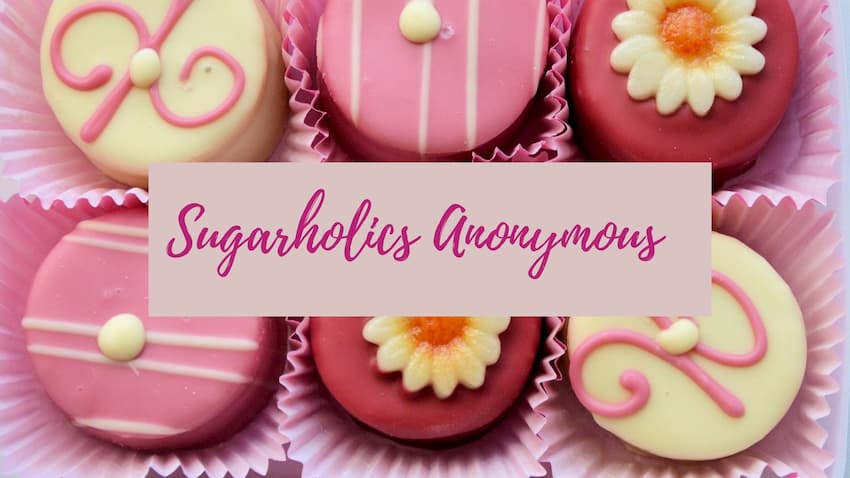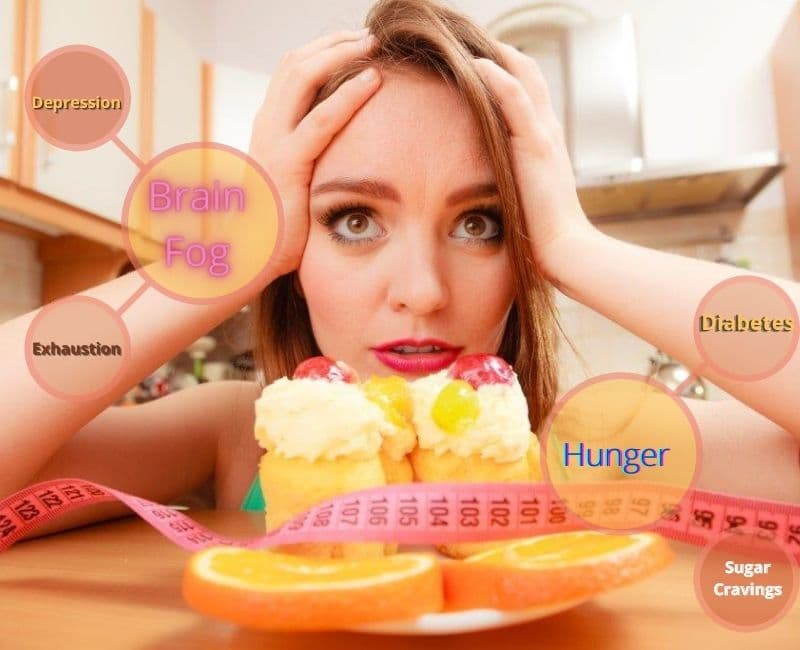Your alarm goes off at 7:00 am ⏰ (if you’re lucky enough to get up that late!). You roll out of bed, rush out the door, and head to work. You grab a muffin (sugar) and a coffee with milk and sugar (sugar) for breakfast. You’re starving by 10:00 am, so you grab a leftover bagel (sugar) in the office kitchen. At noon, you have a sandwich on white bread (sugar) for lunch. You have a date that evening where you have a few glasses of wine (sugar), pasta (sugar), and you can’t help but want dessert (sugar).
No wonder our society is addicted to sugar—it’s everywhere! It’s even in the seemingly less obvious places like yogurt, tomato sauce, and “healthy” protein bars.
I am no stranger to this myself. Growing up in England, my dad got paid on Fridays. My sister and I always got “pocket money” on Fridays when he got home, and we couldn’t wait to get to the little store across the street to buy our favorite sweets (a/k/a candy). That was the start of my love-hate relationship with all things sugary, but especially chocolate. And if I was feeling sad or emotional, sugar always comforted me because it brought me back to the great memories of our Friday treat.
Still, to maintain healthiness, sustained energy, weight, cognitive health, and hormone balance, blood sugar must be balanced throughout the day. But if you’re the example above, this is impossible to do. Your diet leaves you feeling frazzled, exhausted, and constantly hangry. Your hormones are in overdrive, and you are struggling to feel your best day in and day out.
Oh my gosh, how I can relate to that struggle and I am sure many of you can too.
While it may be obvious that eating too much refined sugar can cause weight gain, have you stopped to think about the effect it has on your hormonal health? It causes headaches, digestive trouble, PMS symptoms, cramps, acne, brain fog, and more. And if you find yourself pining for a sweet snack just minutes after finishing a well-rounded meal, well, sugar addiction has caught you red-handed.
Sugar addiction is real. I have often said that I was there was an SA (Sugarholic Anonymous) meeting I could go to!!

But as I have done workshops and taught my classes at the University of South Florida, and even deal with clients one-one, a crucial part of this that people aren’t aware of is that fact that science shows that sugar addiction is comparable to cocaine addiction. Withdrawal symptoms, cravings, and “relapse” behavior are similar to that of a drug addict. No, you’re not crazy, and it’s not all in your head. With the average person (probably unknowingly) consuming 82 grams of sugar (that’s 19.5 teaspoons) per day, it’s no wonder we’re a society of addicts. And the effects of sugar on your health are disastrous.
Our body uses sugar (in the form of glucose) for quick bursts of energy. Our ancestors used these quick bursts of energy do to things like run from a threatening animal. Their cortisol levels would rise (increasing the amount of glucose released in the bloodstream) only to quickly burn it off after they escaped the attack (sugar in their blood would get used up, and their blood sugar would return to baseline).
Back then, sugar was only found in the form of fruits and berries, and they were a rare treat—not a daily indulgence. We, modern-day humans, consume sugar for breakfast, lunch, dinner, and dessert, thanks to the food industry seeping it into pretty much everything. So, what’s really happening in our bodies when we eat sugar?
When we consume simple carbohydrates or refined sugar (either sugar or carbs that have been processed, meaning their nutrients have been stripped from them) these “foods” spike our blood sugar, since there are no nutrients or fiber bound to them to slow digestion. Insulin—a hormone that regulates our blood sugar, goes into overdrive to clean up the mess in our bloodstream. Soon after, our blood sugar crashes dramatically, dipping below a healthy baseline. This, in turn, causes a craving for more sugar and carbs to bring our blood sugar back to baseline. It’s just like being on a roller coast, and if we continue to consume empty, refined sugars, that roller coaster isn’t going to be stopping.
When our blood sugar is spiked, insulin floods the bloodstream. Over time, this can cause your blood sugar to stop responding to insulin. Because insulin is constantly in the bloodstream, sugars don’t get removed. This can lead to diabetes, brain fog, exhaustion, constant hunger, and depression.

If cells are overburdened with stored sugar and can’t take in any more, insulin then carries the excess sugar to our liver, where it gets stored as glycogen. Once the glycogen stores in the liver are filled, this glycogen gets stored as fatty acids and triglycerides in our tissues (hello, weight gain!).
And that’s not all. After consuming sugar, your immune system is depressed for a few hours, meaning you are more susceptible to catching a cold or other illness while riding that sugar wave. Refined sugar is also known for stressing your adrenal glands (which regulate cortisol, the stress hormone, and aldosterone, which controls your blood pressure) and your thyroid (which secretes hormones responsible for maintaining your metabolism, cognitive function, and body temperature.) Cortisol levels often rise when there is an increase in blood sugar levels, which means our stress levels become less manageable, and we’re likely to feel exhausted, wired, and anxious.
Sugar also attacks collagen, the structural protein that’s responsible for elasticity and strength of skin and repairing dead skin cells. So excess sugar consumption can leave us with premature wrinkles and an aging complexion. Not a pretty place to be if we, as women, want to age gracefully.
Sugar also depletes B vitamins from our bodies’ stores. These vitamins are crucial to our mental health, hormonal health, and overall energy levels. Without them, we feel increased feelings of anxiety and depression, have a higher likelihood of insomnia, our cortisol is out of whack, our sex hormone production declines (bye bye, libido!), and we are more likely to experience fertility issues. Excess sugar consumption is also linked to exacerbated PMS symptoms such as headaches, cramps, irritation, and moodiness.
I don’t know about you, but when I look at my sugar intake from this perspective, that’s when the “hate” relationship with chocolate and other sugary substances kick in. In my continual walk to live a balanced, healthy lifestyle, I have found that sugar is one of the stumbling blocks I’ve encountered often, but yet for me, it is also one that I know I can overcome.
If you struggle with your sugar intake and it has become a stumbling block in your life, I would love to have a chat with you about this. Reply to this email, and we will schedule a Healthy You Breakthrough Clarity call. You don’t have to go through this alone.
If you’d like to reduce sugar in your life, I’d love to help with a few simple actionable steps that can make a big difference for you. Click the picture to contact me.




Wonderful advice throughout this article. Thank you for sharing with us.
Thank you Melissa. A subject near and dear to my heart 🙂
Another awesome post packed full of helpful information – wish I’d known all this before my Adult Onset Diabetes. Thank you.
I know exactly what you mean. I wish I had known all of this years and years ago.